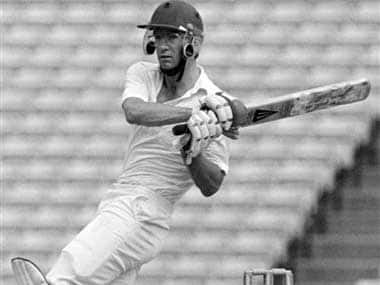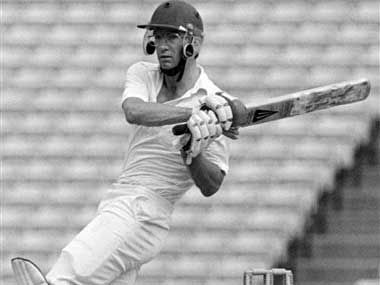When I first saw the news of Peter Roebuck’s passing yesterday, I numbly checked Gmail to see if he’d emailed me to say he was dead — a surreal response, to the uncommon circumstance of finding out about the death of a friend via the impersonal means of a news website. At the time of writing we do not yet know the exact chain of events that caused Roebuck to take his own life — assuming that he did, and that this was not an accident or worse — but as some commentators (who knew him for much longer as equals) have observed, such a bizarrely tragic denouement cannot be viewed as wholly unexpected, even if it did come as a shock. I encountered Roebuck for the first time during a Test match featuring India and Australia several years ago in Chennai, as he was entering the last decade of his life. It was my first major cricket gig; having parked myself on one of the chairs in the muggy heat outside the air-conditioned media box (which was the domain of the bigwigs) I looked to my right and was confronted by a famous face shaded by a quixotic straw hat and wearing a pained look. [caption id=“attachment_130501” align=“alignleft” width=“380” caption=“Roebuck when he was captain of Somerset. AP”]
 [/caption] For some reason that morning Roebuck was sitting among us commoners, the lowliest of writers, who were required to report on proceedings from the Chidambaram stadium’s top stand, above the electrifying hoo-haa’s of the paying public. He was grumbling about his computer but it seemed to me the problem lay in his abysmal typing skills. He sat there gazing intensely at the keyboard and poking away, using the index finger on both hands, like a spectacularly unskilled pianist massacring Chopin. How such an ungainly clickety-clack action should produce some of the finest cricket prose committed to page since Cardus will never cease to astonish me. I know editors who privately raged at his whimsical syntax, his seemingly cluttered mind, but they held no grievances against his ideas, which while forceful and polarising, were always compelling. At lunch that first afternoon, I cornered him to pick his brains; to my mild consternation he squeezed my biceps and pronounced me fit for sport. As a young and not-too-worldlywise cub reporter I did not quite know what to make of any of it. This awkward quid pro quo moment would however make way for an unexpected friendship, and some of the most invigorating discussions I have ever had. We would meet sporadically when he breezed through on tours, but kept up correspondence over email. He proved an eccentric mentor but always generous; he was kind enough to praise my early work in one of his columns for the Sydney Morning Herald. While writing this piece I considered leaving out the more exuberant aspects of his behaviour, for fear my description should dilute his complexity and leave him open to caricature, but to do so would invalidate the lessons I learned from a man who spent much of his career illuminating truths as he saw them. While he lived he was a difficult man to know, although he was always willing to share his views on big-picture ideas. I can happily attest to the fact that he remained a fierce idealist to the end. In one email he sent earlier this year, he wrote (I quote the relevant bits verbatim, and this includes those crazy, chaotic typing errors I am bound to miss):
[/caption] For some reason that morning Roebuck was sitting among us commoners, the lowliest of writers, who were required to report on proceedings from the Chidambaram stadium’s top stand, above the electrifying hoo-haa’s of the paying public. He was grumbling about his computer but it seemed to me the problem lay in his abysmal typing skills. He sat there gazing intensely at the keyboard and poking away, using the index finger on both hands, like a spectacularly unskilled pianist massacring Chopin. How such an ungainly clickety-clack action should produce some of the finest cricket prose committed to page since Cardus will never cease to astonish me. I know editors who privately raged at his whimsical syntax, his seemingly cluttered mind, but they held no grievances against his ideas, which while forceful and polarising, were always compelling. At lunch that first afternoon, I cornered him to pick his brains; to my mild consternation he squeezed my biceps and pronounced me fit for sport. As a young and not-too-worldlywise cub reporter I did not quite know what to make of any of it. This awkward quid pro quo moment would however make way for an unexpected friendship, and some of the most invigorating discussions I have ever had. We would meet sporadically when he breezed through on tours, but kept up correspondence over email. He proved an eccentric mentor but always generous; he was kind enough to praise my early work in one of his columns for the Sydney Morning Herald. While writing this piece I considered leaving out the more exuberant aspects of his behaviour, for fear my description should dilute his complexity and leave him open to caricature, but to do so would invalidate the lessons I learned from a man who spent much of his career illuminating truths as he saw them. While he lived he was a difficult man to know, although he was always willing to share his views on big-picture ideas. I can happily attest to the fact that he remained a fierce idealist to the end. In one email he sent earlier this year, he wrote (I quote the relevant bits verbatim, and this includes those crazy, chaotic typing errors I am bound to miss):
i am rathe more with Hazare than some he has indeed defied our impotence I think it is part of a wave of uprisings as the newly emancipated “common man” (glib concept i admit!) armed with means of communication pritest against a serfom imposed by greedy leaders. i see the world in part as a struggle between the corrupt and the common man ( yes, yes, i know..) Whatever the risks events in Libya, Tunisia, Egypt are liberating whilst Jordan, sensing the wind, has intoduced constituiona;democracy High food prices, Obama and facebook have helped Now Syria is under huge pressure Perhaps it is India’s turn hell it only took one man to burn himself and al north aabia was up in arms cheers P
In order to know him I had to piece together his personality with the patience of a forensic anthropologist. His defense mechanisms were too sophisticated to blow past without resistance; therefore I needed to see him as one of those fictional characters who, through their dialogue, reveal much more about themselves than they would wish to. Whatever his flaws, the man went far too early. Perhaps the only consolation lies in the hope that in death, we may all know this troubled genius a little better.
Vijay Parthasarathy covered the city transport beat for The Indian Express, Delhi, and wrote on sport, music and books for The Hindu for many years before leaving to get a PhD at the University of Texas, Austin, on cultural globalisation. He has an undergraduate degree in Physics from St. Xavier’s College, Mumbai, a PGDip. in print media from Asian College of Journalism, Chennai, and a MA in Creative Writing from the University of East Anglia, Norwich. His fiction has appeared in the Penguin Book of New Writing from India and Litro. He blogs at the heretic (http://garplives.blogspot.com/</a>).
)